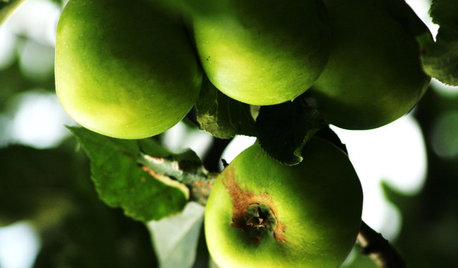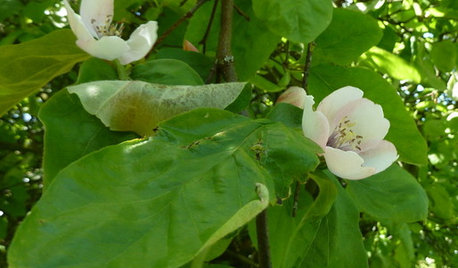Organic spray for Apple trees
jbest123
16 years ago
Related Stories

EDIBLE GARDENSHow to Add an Apple Tree to Your Edible Garden
Readily available, beautiful and fragrant, apple trees offer four-season interest along with crisp, juicy fruit
Full Story
GARDENING AND LANDSCAPINGCrab Apple Trees Set Off a Stylish English Courtyard
A structure of pleached crab apple trees, bordered by a wildflower meadow, links a minimalist addition to an old house in Buckinghamshire
Full Story
EDIBLE GARDENSWhy Grow Quince? For Beauty, Fragrance and Old-Time Flavor
Delightfully perfumed fruit and lovely spring blossoms make this apple and pear cousin worth a spot in the garden
Full Story
GARDENING AND LANDSCAPINGCrazy for Fruit Trees
Whether a single citrus or a mini apple orchard, even the smallest landscape space can bear deliriously delicious fruit
Full Story
GARDENING GUIDESHow to Keep Your Trees Healthy
Ensure your trees’ vigor for years to come with these tips for protecting roots, watering effectively and more
Full Story
GARDENING GUIDESHow to Keep Your Citrus Trees Well Fed and Healthy
Ripe for some citrus fertilizer know-how? This mini guide will help your lemon, orange and grapefruit trees flourish
Full Story
ARBOR DAY8 Reasons to Plant a Great Tree
Beauty is its own reward, but the benefits of planting the right tree in the right place go way beyond looks
Full Story
CHRISTMASReal vs. Fake: How to Choose the Right Christmas Tree
Pitting flexibility and ease against cost and the environment can leave anyone flummoxed. This Christmas tree breakdown can help
Full Story
GARDENING GUIDES5 Best-Behaved Trees to Grace a Patio
Big enough for shade but small enough for easy care, these amiable trees mind their manners in a modest outdoor space
Full Story
THE ART OF ARCHITECTUREWorld of Design: Trees Bring Nature to a High-Rise in Milan
Discover ‘the most beautiful and innovative skyscraper in the world’ — the foliage-filled Bosco Verticale — and tour one of its apartments
Full StoryMore Discussions







dchall_san_antonio
sequoia851
Related Professionals
Bridgetown Landscape Architects & Landscape Designers · Comstock Park Landscape Architects & Landscape Designers · Winder Landscape Architects & Landscape Designers · Bloomington Landscape Contractors · Euclid Landscape Contractors · Lynchburg Landscape Contractors · Milford Mill Landscape Contractors · Milton Landscape Contractors · New Providence Landscape Contractors · Oviedo Landscape Contractors · Alvin Decks, Patios & Outdoor Enclosures · Chicago Decks, Patios & Outdoor Enclosures · Cincinnati Decks, Patios & Outdoor Enclosures · Framingham Decks, Patios & Outdoor Enclosures · Salt Lake City Decks, Patios & Outdoor Enclosuresalthea_gw
led_zep_rules
Kimmsr
jbest123Original Author
fruitgirl
jbest123Original Author
fruitgirl
Kimmsr
sunnybunny
Dan _Staley (5b Sunset 2B AHS 7)
Michael
Dan _Staley (5b Sunset 2B AHS 7)
Michael
jackw1
Dan _Staley (5b Sunset 2B AHS 7)
docgipe
Michael
Dan _Staley (5b Sunset 2B AHS 7)
docgipe
Michael
mona_ruiz_comcast_net
kokos